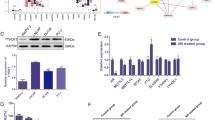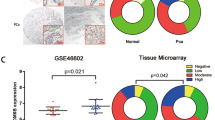Abstract
Background
Androgen-independent prostate cancer (AIPC) is an extremely malignant tumor developed from the androgen dependent (ADPC). However, the mechanism of transition process from ADPC to AIPC remains unknown.
Objective
Here we aimed to identify the androgen receptor (AR) target gene and its roles in AIPC.
Methods
Target genes of AR were identified by ChIP-seq in AIPC cells. AR target gene PCDH7 was detected by real time PCR and western blot. Methylation of PCDH7 was measured by bisulfite sequencing and bisulfite amplicon sequencing. Cell growth, invasion and apoptosis were measured by CCK-8, transwell and flow cytometry, respectively.
Results
AR was significantly enriched in the upstream of PCDH7 gene. The expression of PCDH7 was significantly decreased, while the methylation of PCDH7 was increased in the AIPC cells compared to the ADPC cells. DNA methyltransferase inhibitor significantly suppressed the methylation and increased the mRNA and protein level of PCDH7. Moreover, overexpression of DNMT1 remarkably reduced the mRNA and protein level of PCDH7. DNA methyltransferase inhibitor decreased the cell growth and invasion while promote the cell apoptosis in the AIPC cells. AR significantly target PCDH7, whose hypermethylation may repress cell growth and invasion, and promote apoptosis in AIPC.
Conclusions
This study might provide a novel potential target for the treatment of AIPC.




Similar content being viewed by others
Availability of data and materials
The datasets used and/or analyzedduring the current study are available from the corresponding author on reasonable request.
References
Bahnson R (2007) Androgen deprivation therapy for prostate cancer. J Urol 178:1148
Beukers W, Hercegovac A, Vermeij M, Kandimalla R, Blok AC, van der Aa MM, Zwarthoff EC, Zuiverloon TC (2013) Hypermethylation of the polycomb group target gene PCDH7 in bladder tumors from patients of all ages. J Urol 190:311–316
Chen CD, Welsbie DS, Tran C, Baek SH, Chen R, Vessella R, Rosenfeld MG, Sawyers CL (2004) Molecular determinants of resistance to antiandrogen therapy. Nat Med 10:33–39
Christman JK (2002) 5-Azacytidine and 5-aza-2′-deoxycytidine as inhibitors of DNA methylation: mechanistic studies and their implications for cancer therapy. Oncogene 21:5483–5495
Craft N, Shostak Y, Carey M, Sawyers CL (1999) A mechanism for hormone-independent prostate cancer through modulation of androgen receptor signaling by the HER-2/neu tyrosine kinase. Nat Med 5:280–285
Feldman BJ, Feldman D (2001) The development of androgen-independent prostate cancer. Nat Rev Cancer 1:34–45
Garcia-Manero G, Kantarjian HM, Sanchez-Gonzalez B, Yang H, Rosner G, Verstovsek S, Rytting M, Wierda WG, Ravandi F, Koller C et al (2006) Phase 1/2 study of the combination of 5-aza-2'-deoxycytidine with valproic acid in patients with leukemia. Blood 108:3271–3279
Gregory CW, He B, Johnson RT, Ford OH, Mohler JL, French FS, Wilson EM (2001) A mechanism for androgen receptor-mediated prostate cancer recurrence after androgen deprivation therapy. Cancer Res 61:4315–4319
Grossmann ME, Huang H, Tindall DJ (2001) Androgen receptor signaling in androgen-refractory prostate cancer. J Natl Cancer Inst 93:1687–1697
Heidenreich A, Aus G, Bolla M, Joniau S, Matveev VB, Schmid HP, Zattoni F (2008) EAU guidelines on prostate cancer. Eur Urol 53:68–80
Heinlein CA, Chang C (2004) Androgen receptor in prostate cancer. Endocr Rev 25:276–308
Hsieh AC, Small EJ, Ryan CJ (2007) Androgen-response elements in hormone-refractory prostate cancer: implications for treatment development. Lancet Oncol 8:933–939
Jerónimo C, Henrique R, Hoque MO, Mambo E, Ribeiro FR, Varzim G, Oliveira J, Teixeira MR, Lopes C, Sidransky D (2004) A quantitative promoter methylation profile of prostate cancer. Clin Cancer Res 10:8472–8478
Kinoshita H, Shi Y, Sandefur C, Meisner LF, Chang C, Choon A, Reznikoff CR, Bova GS, Friedl A, Jarrard DF (2000) Methylation of the androgen receptor minimal promoter silences transcription in human prostate cancer. Cancer Res 60:3623–3630
Kulis M, Esteller M (2010) DNA methylation and cancer. Adv Genet 70:27–56
Kumar-Sinha C, Tomlins SA, Chinnaiyan AM (2008) Recurrent gene fusions in prostate cancer. Nat Rev Cancer 8:497–511
Li J, Yen C, Liaw D, Podsypanina K, Bose S, Wang SI, Puc J, Miliaresis C, Rodgers L, McCombie R et al (1997) PTEN, a putative protein tyrosine phosphatase gene mutated in human brain, breast, and prostate cancer. Science 275:1943–1947
Lin YL, Wang YL, Fu XL, Li WP, Wang YH, Ma JG (2016) Low expression of protocadherin7 (PCDH7) is a potential prognostic biomarker for primary non-muscle invasive bladder cancer. Oncotarget 7:28384–28392
Massie CE, Mills IG (2011) Global identification of androgen response elements. Methods Mol Biol 776:255–273
Michaelson MD, Marujo RM, Smith MR (2004) Contribution of androgen deprivation therapy to elevated osteoclast activity in men with metastatic prostate cancer. Clin Cancer Res 10:2705–2708
Mohler JL, Gregory CW, Ford OH 3rd, Kim D, Weaver CM, Petrusz P, Wilson EM, French FS (2004) The androgen axis in recurrent prostate cancer. Clin Cancer Res 10:440–448
Pernar CH, Ebot EM, Wilson KM, Mucci LA (2018) The epidemiology of prostate cancer. Cold Spring Harb Perspect Med 8:a030361
Schroder FH (2008) Progress in understanding androgen-independent prostate cancer (AIPC): a review of potential endocrine-mediated mechanisms. Eur Urol 53:1129–1137
Singer EA, Golijanin DJ, Miyamoto H, Messing EM (2008) Androgen deprivation therapy for prostate cancer. Expert Opin Pharmacother 9:211–228
Tingting Q, Gang X, Lili J, Zhihua T (2013) Preliminary screening of differentially methylated genes in androgen-independent prostate cancer cell line. Chin J Cell Biol 35:24–29
Tsai HK, D'Amico AV, Sadetsky N, Chen MH, Carroll PR (2007) Androgen deprivation therapy for localized prostate cancer and the risk of cardiovascular mortality. J Natl Cancer Inst 99:1516–1524
Xu G, Wu J, Zhou L, Chen B, Sun Z, Zhao F, Tao Z (2010) Characterization of the small RNA transcriptomes of androgen dependent and independent prostate cancer cell line by deep sequencing. PLoS ONE 5:e15519
Yadav N, Heemers HV (2012) Androgen action in the prostate gland. Minerva Urol Nefrol 64:35–49
Zhu X, Leav I, Leung YK, Wu M, Liu Q, Gao Y, McNeal JE, Ho SM (2004) Dynamic regulation of estrogen receptor-beta expression by DNA methylation during prostate cancer development and metastasis. Am J Pathol 164:2003–2012
Acknowledgements
This work was supported by the medical and health science and technology plan of Zhejiang Province (2016KYA176).
Author information
Authors and Affiliations
Contributions
Conceptualization: XQ. Data curation: XW. Formal analysis: SQ. Funding acquisition: XQ. Investigation: SQ, JG, YN. Methodology: ZT, HL. Software: CF, SC. Writing—original draft: SQ. Writing—review & editing: XW, HL, CF. All authors read and approved the manuscript.
Corresponding author
Ethics declarations
Conflict of interest
The authors declare that they have no conflict of interest.
Ethics approval and consent to participate
Not applicable.
Patient consent for publication
Not applicable.
Additional information
Publisher's Note
Springer Nature remains neutral with regard to jurisdictional claims in published maps and institutional affiliations.
Electronic supplementary material
Below is the link to the electronic supplementary material.
Rights and permissions
About this article
Cite this article
Xu, S., Wu, X., Tao, Z. et al. Effect of aberrantly methylated androgen receptor target gene PCDH7 on the development of androgen-independent prostate cancer cells. Genes Genom 42, 299–307 (2020). https://doi.org/10.1007/s13258-019-00903-w
Received:
Accepted:
Published:
Issue Date:
DOI: https://doi.org/10.1007/s13258-019-00903-w




